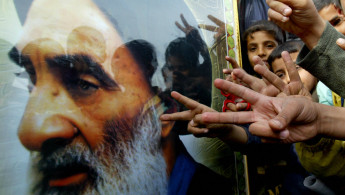Sistani warns of Iraq partition if reforms aren't implemented
Iraq's top Shia cleric, Grand Ayatollah Ali al-Sistani, warned on Thursday that the country faced dire consequences including possible "partition" - unless substantial reforms are not carried out.
Sistani, who is revered by millions of Iraqis and has unmatched prestige in the country, has made several calls for reforms this month that have played a major role in a wide-ranging anti-corruption drive by Prime Minister Haider al-Abadi.
"Today, if true reform is not realised by fighting corruption without mercy and realising social justice on different levels, it is expected that circumstances will become worse than before," Sistani said in a written response from his office to questions from AFP.
Iraq could be "dragged to... partition and the like, God forbid", he said.
It was Sistani's most direct warning yet over the possible consequences if reforms he has advocated are not carried out.
Sistani said that corruption had already cost Iraq dearly in the conflict with the Islamic State jihadist group, which overran around a third of the country last year.
"Without rampant corruption, especially in the security forces, and misuse of power by top officials, the [Islamic State group] terrorist organisation would not have been able to control a large part of the territory of Iraq," he said.
| [Many Iraqi politicians] did not take the overall interest of the Iraqi people into consideration - Ayatollah Sistani |
Political concerns
Many Iraqi politicians, Sistani said, "did not take the overall interest of the Iraqi people into consideration, and were instead concerned with their personal interests, and factional, sectarian and ethnic" concerns.
Abadi rolled out a reform programme this month in response to popular pressure from weeks of protests against rampant corruption and abysmal services, and a call from Sistani for drastic change.
| Read more: The heat of protests in Iraq forces government reforms |
Parliament approved Abadi's plan along with additional measures, but a major gap remains between the announcement and its implementation.
Abadi moved ahead with his reform drive on Thursday, ordering "major cuts in the number of personal guards for officials and the presidencies and others, reaching up to 90 percent", his office said in a statement.
He also ordered "the abolition of the special protection regiments belonging to individuals and their return to the defence and interior ministries", the statement said, referring to large guard units of some senior officials.
The measures will see more 20,000 guards - on the state payroll at more than 250 billion dinars ($208.3 million) per year to protect a limited number of officials - become available for duty with the army and police, spokesman Saad al-Hadithi said.
Abadi also ordered the reallocation of the funds budgeted for the positions of deputy premier, which he has removed, and vice-president, which he has proposed cutting.
A committee of specialists is to be formed to select candidates for senior posts, and the pay limit for controversially high pensions is to be lowered, among other measures.
| Protesters have railed against the poor quality of services, especially power outages |
'Drastic measures'
The orders came four days after Abadi announced he was scrapping 11 of 33 cabinet posts, cutting three deputy premier positions and four ministerial posts, and merging four more ministries.
Amid a major heatwave that has seen temperatures top 50 degrees Celsius (120 degrees Fahrenheit), protesters have railed against the poor quality of services, especially power outages that leave just a few hours of government-supplied electricity per day.
Thousands of people have turned out in Baghdad and cities in the Shia south to vent their anger and pressure the authorities to make changes.
Their demands were given a boost when on 7 August, Sistani called on Abadi to take "drastic measures" against corruption, saying the "minor steps" he had announced fell short.
Abadi announced his reform plan two days later.
The following Friday, Sistani said judicial reforms were needed, and Abadi responded by calling on the judiciary to carry out measures to ensure its independence and allow it to fight corruption.





 Follow the Middle East's top stories in English at The New Arab on Google News
Follow the Middle East's top stories in English at The New Arab on Google News


